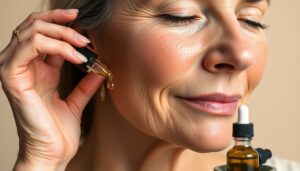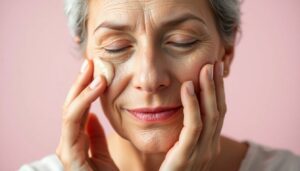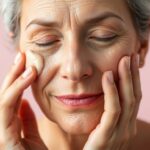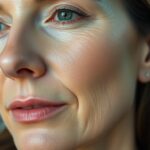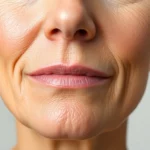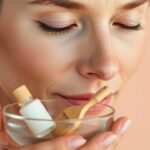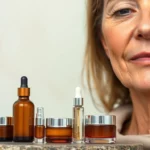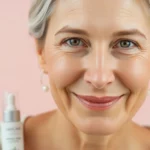Ever look in the mirror and spot a new line or wrinkle? It’s a common worry, and it can be frustrating. Our skin changes as we get older, and that’s just a fact. One of the biggest changes? It starts losing moisture. This makes those fine lines and wrinkles stand out even more. But don’t worry! A good moisturizer can be a game-changer. This article is here to guide you toward the best moisturizer for your aging skin, so keep reading!
Understanding Aging Skin and Its Moisture Needs
As time marches on, our bodies change. Our skin is no different. There are biological reasons why skin ages, and knowing them can help us take better care of it. Understanding the way it shifts helps choose the correct products.
How Skin Changes as We Age
Collagen is like the scaffolding that keeps our skin firm and plump. As we age, our bodies produce less collagen. Studies have shown collagen production decreases significantly over time. This is a major reason why skin starts to sag and wrinkle. Elastin, another important protein, also declines, making skin less elastic. Oil production also decreases, which leads to dryness. Cell turnover, the process where old skin cells are replaced by new ones, also slows down. All these factors combine to make skin look older. Seeing photos of yourself at different ages can highlight these changes.
The Importance of Moisture for Mature Skin
Moisture is key for healthy, youthful-looking skin. When skin is well-hydrated, wrinkles appear less noticeable. Moisture also helps to support the skin’s barrier function, which protects against environmental damage. Dry skin is a common problem for older adults, so moisturizing becomes even more critical.
Ingredients to Look for (and Avoid)
When shopping for a moisturizer, keep an eye out for certain ingredients. Some ingredients are super beneficial. Others might not be worth the money. Avoid harsh chemicals or strong fragrances.
Top Moisturizing Ingredients for Mature Skin
Certain ingredients stand out when it comes to moisturizing mature skin. These ingredients work in different ways to hydrate, protect, and rejuvenate the skin. Knowing how these ingredients work will help you select the best product.
Hyaluronic Acid: The Hydration Hero
Hyaluronic acid is a hydration superstar. It works like a sponge, attracting and holding moisture from the air. This helps to plump up the skin, reducing the appearance of fine lines. To get the most out of hyaluronic acid, apply it to damp skin. This helps it trap more moisture.
Retinoids: The Wrinkle Fighter
Retinoids are powerful ingredients that can help reduce wrinkles and improve skin texture. They work by speeding up cell turnover and boosting collagen production. However, retinoids can also cause irritation and dryness. Start slowly, using a small amount a few times a week. Gradually increase frequency as your skin tolerates it.
Ceramides: The Barrier Repairer
Ceramides are lipids (fats) that are naturally found in the skin. They play a crucial role in maintaining the skin’s barrier function. As we age, ceramide levels decrease. Using moisturizers with ceramides helps to replenish these lost lipids, strengthening the skin barrier and preventing moisture loss. Ceramides are very important for aging skin.
Selecting the Right Moisturizer for Your Skin Type
Not all skin is created equal. What works for one person might not work for another. That is why it’s vital to find products for your skin. Consider if you have dry, oily, combination, or sensitive skin.
Moisturizers for Dry Aging Skin
If you have dry, aging skin, look for rich, emollient moisturizers. These moisturizers contain ingredients that help to soothe and hydrate dry skin. Occlusive ingredients create a barrier that prevents moisture loss. A good option would be a cream with shea butter and hyaluronic acid.
Moisturizers for Oily Aging Skin
Even oily skin needs moisture! But you’ll want a lightweight, non-comedogenic formula. These moisturizers hydrate without clogging pores. Look for gel-based moisturizers or lotions with ingredients like salicylic acid.
Moisturizers for Sensitive Aging Skin
Sensitive skin needs gentle care. Choose fragrance-free, hypoallergenic moisturizers. Avoid products with harsh chemicals or irritants. Look for moisturizers with calming ingredients. One great choice would be a cream with aloe vera.
Incorporating Moisturizers into Your Anti-Aging Routine
Moisturizers are just one piece of the puzzle. To get the most out of them, you need to incorporate them into a complete skincare routine. How and when you apply moisturizer is important.
The Best Time to Apply Moisturizer
The best time to apply moisturizer is after cleansing and exfoliating. This is when your skin is most receptive to hydration. Applying moisturizer to damp skin helps to lock in moisture.
Layering Moisturizers with Other Skincare Products
Layering your skincare products correctly is essential. Apply products from thinnest to thickest consistency. Start with serums, followed by toners, then moisturizers, and finally sunscreen. This ensures each product can absorb properly.
Lifestyle Factors That Impact Skin Hydration
Skincare isn’t just about what you put on your skin. Lifestyle also plays a big role. Diet, hydration, and sun protection are all important. Drink plenty of water and wear sunscreen daily.
Busting Common Myths About Moisturizers and Aging Skin
There are many myths about moisturizers and aging skin. It’s time to set the record straight. Knowing the truth will help you make informed choices.
Myth: Expensive Moisturizers Are Always Better
Price doesn’t always equal quality. Some affordable moisturizers can be just as effective as high-end ones. It’s all about the ingredients. A simple cream with ceramides can work wonders.
Myth: Moisturizers Can Erase Wrinkles Completely
Moisturizers can reduce the appearance of wrinkles, but they can’t eliminate them completely. They provide hydration, making skin look plumper. But they don’t reverse the aging process. According to dermatologists, moisture is key to healthy skin but can’t turn back time.
Myth: Oily Skin Doesn’t Need Moisturizer
Even oily skin needs hydration. Skipping moisturizer can actually cause your skin to produce more oil. A light, oil-free moisturizer can help balance your skin.
Conclusion
Choosing the right moisturizer for aging skin can seem daunting. Keep in mind these key points to keep your skin looking youthful. Moisture is essential for healthy skin. Remember to experiment and find what works best for you!


